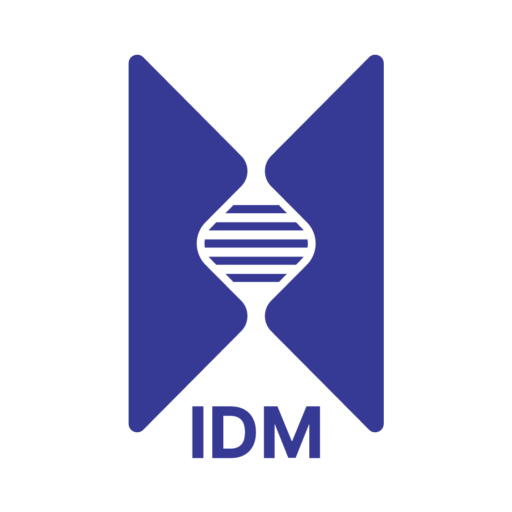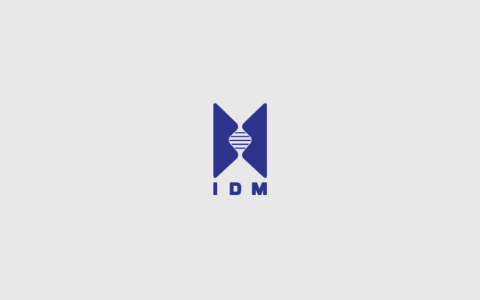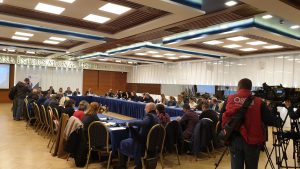 Tirana, 12 December 2019 – The Institute for Democracy and Mediation (IDM) organized a policy forum “Reforming EU enlargement – Tirana’s perspective” to discuss preferred and realistic scenarios for EU accession of the Western Balkans. The event generated a discussion among policy and political stakeholders, think tanks, media, business associations and academia to elaborate Tirana’s perspective on, and preferred alternatives for, reviving the transformative power of EU accession. Speakers at the event were Tena Prelec (Oxford University), Kristof Bender (European Stability Initiative), Zoran Nechev (IDSCS Skopje), Gjergji Vurmo (IDM Albania), Selami Xhepa (Chair of Tirana European University), Ben Andoni (Journalist), Gledis Gjipali (European Movement Albania), Teuta Vodo (Secretary of Foreign Relations, SP) and Arben Kashahu (Secretary of Foreign Relations, DP).
Tirana, 12 December 2019 – The Institute for Democracy and Mediation (IDM) organized a policy forum “Reforming EU enlargement – Tirana’s perspective” to discuss preferred and realistic scenarios for EU accession of the Western Balkans. The event generated a discussion among policy and political stakeholders, think tanks, media, business associations and academia to elaborate Tirana’s perspective on, and preferred alternatives for, reviving the transformative power of EU accession. Speakers at the event were Tena Prelec (Oxford University), Kristof Bender (European Stability Initiative), Zoran Nechev (IDSCS Skopje), Gjergji Vurmo (IDM Albania), Selami Xhepa (Chair of Tirana European University), Ben Andoni (Journalist), Gledis Gjipali (European Movement Albania), Teuta Vodo (Secretary of Foreign Relations, SP) and Arben Kashahu (Secretary of Foreign Relations, DP).
In October 2019, the European Council failed for the second time this year to give the green light for opening accession negotiations with Albania and North Macedonia, due to France’s veto and strong stance over the need to reform the current accession process. Although the decision was received with skepticism, it created a momentum for an open debate on the transformative power of the EU and its enlargement process.
The need to reinvigorate the process of EU accession in the Western Balkans has been articulated by local and EU stakeholders involved in the process. Several proposals and pathways with regards to reforming EU enlargement have been presented over the last weeks, including the extra criteria as elaborated by the German Bundestag, the ‘mini-Schengen’ proposal and the French non-paper. Often, the implications of these proposals are only discussed for the European Union and less from the perspective of the accessing countries. Therefore, this policy forum focused specifically on the perspective of Albania with regards to preferred and realistic scenarios for EU accession. This does not only give context to the rather technical discussions taking place at a government level, but also encourages an informed discussion among EU Institutions and Member States about the future of enlargement.
EU Enlargement – Possible Avenues for Reform
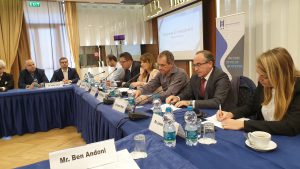 The first panel consisted of four researchers on the topic, presenting different scenarios for reforming the enlargement process. Mr. Gjergji Vurmo, Program Manager of IDM Albania, presented his paper “The Western Balkans’ EU Dream: Ambition Calls for a New Process“. According to Mr. Vurmo, the accession framework for the Western Balkans must be upgraded. Having served its core purpose of ‘stabilizing’ the post-war region, and with only one success story – Croatia’s EU accession – the Stabilization and Association Process (SAP) has failed to accelerate the transformation and the EU’s accession track for other Western Balkan countries. It is of paramount importance to centralize efforts through a revived enlargement process for the Western Balkans with a clear time frame (stages), stronger conditionality, and more efficient financial assistance that channels support for accession reforms, economic development and competitiveness under a single instrument.
The first panel consisted of four researchers on the topic, presenting different scenarios for reforming the enlargement process. Mr. Gjergji Vurmo, Program Manager of IDM Albania, presented his paper “The Western Balkans’ EU Dream: Ambition Calls for a New Process“. According to Mr. Vurmo, the accession framework for the Western Balkans must be upgraded. Having served its core purpose of ‘stabilizing’ the post-war region, and with only one success story – Croatia’s EU accession – the Stabilization and Association Process (SAP) has failed to accelerate the transformation and the EU’s accession track for other Western Balkan countries. It is of paramount importance to centralize efforts through a revived enlargement process for the Western Balkans with a clear time frame (stages), stronger conditionality, and more efficient financial assistance that channels support for accession reforms, economic development and competitiveness under a single instrument.
Following Mr. Vurmo’s speech, Tena Prelec (Oxford University) discussed a revised version of her co-authored ECFR analysis “Flatter and faster: New Western Balkans pathways to the EU”. Ms. Prelec commenced her presentation with highlighting the negative spiral that is created by the constant delays of the EU to open negotiations with Albania and North Macedonia. Candidate countries and potential candidate countries implement reforms with the prospect of getting EU accession in return. If the implemented transformative reforms are not rewarded by the EU, the political will of accession countries to implement costly reforms will diminish. With the political elite in accession countries having little will to reform, the political elite in the EU will have little incentive to follow through with the accession of (pre-)candidate countries.
To maintain the transformative power of the EU accession process, the paper “Flatter and Faster” makes a proposal to break the negative spiral of political based on three principles. Firstly, a complete overhaul of the accession process such as proposed by the French non-papers is not possible, as it is not realistic. Changes to the accession process should be substantial but subtle. Second, the Western Balkans should accept nothing less than full membership and should continue to work towards that goal. And lastly, the issue of a lack of political will should be fixed.
In order to do so, Prelec proposes a quicker process, more funds for (pre-)accession countries, and a flatter process of multiple sectors accessing simultaneously. However, the process should include not only a carrot, but also a stick. If the reform process is backsliding, funds should be paused or redirected to non-state actors that are working to improve a certain sector. in this way, the country is still advancing and funds are spent where they are most useful.
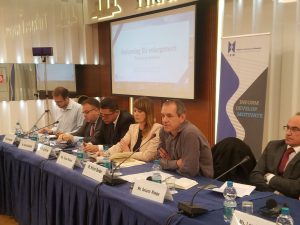 In his presentation of the ESI analysis “Coup de grâce – Delors and squaring the circle – Norway in the Balkans”, Kristof Bender (ESI) argues that Macron’s decision to block accession for Albania and North Macedonia did not create a crisis. Rather, it made an already existing crisis visible to everyone. The accession of the Western Balkans to the European Union, according to Bender, will not happen for as long as the EU does not look the way we want it to look. It will take time to solve the internal issues and in the meantime, it is important to provide the Western Balkans with a tangible interim goal to push reforms.
In his presentation of the ESI analysis “Coup de grâce – Delors and squaring the circle – Norway in the Balkans”, Kristof Bender (ESI) argues that Macron’s decision to block accession for Albania and North Macedonia did not create a crisis. Rather, it made an already existing crisis visible to everyone. The accession of the Western Balkans to the European Union, according to Bender, will not happen for as long as the EU does not look the way we want it to look. It will take time to solve the internal issues and in the meantime, it is important to provide the Western Balkans with a tangible interim goal to push reforms.
Countries like Lithuania and Romania advanced drastically after they accessed the single market. To advance the Western Balkans in a similar way, Bender proposes to include Western Balkans in a single market too. In order to make this a process alongside of the EU accession process, it is important to create clear benchmark and include a financial reward for meeting these benchmarks. This interim goal should include all the countries of the Western Balkan, including Kosovo and Bosnia and Herzegovina, and it should include clear benchmarks and rewards.
The final speaker of the first panel was Zoran Nechev (IDSCS Skopje), whom discussed how reform scenarios translate in Western Balkan countries. Mr. Nechev commenced his presentation with a provocation, arguing that the French non-paper was not written to make accession more difficult for Albania and North Macedonia, or to block their accession entirely. Instead, its main intention was to stop the accession process of Serbia and Montenegro as the decision was made almost immediately after a French delegation had visited Belgrade.
According to Nechev, it is good that there is now a proposal, or several proposals, to improve and streamline the process. However, an improved process will never make up for the lack of political will. If you compare the current accession process of the Western Balkan countries and compare it to that of Croatia, there is a clear difference. In the case of Croatia, there were weekly meetings to discuss where reforms could be pushed to continue advance accession. Chapters were opened and closed very rapidly. In Serbia and Montenegro, on the other hand, it takes a lot of time to go through the acquis. In Serbia for example only two chapters were opened in the entire year.
Considering that accession seems to be a lengthy process that is far from over, it would be suitable to give (pre-)accession countries access to more structural forms. However, Nechev remains skeptical as per where these fund need to come from. The IPA is insufficient, the French and Germans are not willing to pour in more money and the Chinese only provide funds that come with attached with unwanted strings. The “more for more” concept that Ms. Prelec proposes will therefore be hard to realize, despite it being a valuable idea.
For the future, Nechev proposes to open chapters 23 and 24 (also often considered “fundamentals”) immediately after a country receives candidate status. In addition, the accession process should be better structured and engage all levels of society, including civil society, the parliament and actors on the societal level. And lastly, the EU representatives should visit the region frequently in order to get a better sense of how the accession process is being implemented at all levels.
Tirana’s perspective – preferred and realistic scenarios for EU accession reform
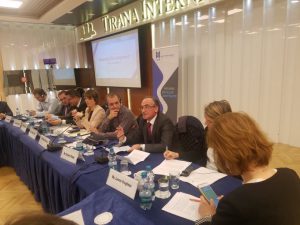
The second panel, Tirana’s perspective – preferred and realistic scenarios for EU accession reform featured five speakers from Albania. The intention of this panel was to move away from the regional perspective by discussing what it would mean for Albania and each specific interest group represented in the panel, if one of the proposed reforms of the EU accession process would become reality. It also discussed what the consequences are if business remains as usual. In his remarks, Mr. Selami Xhepa (Chair of Tirana European University) focused on how the Albanian economy would be affected by the different enlargement reform scenarios. Mr. Xhepa commenced with stating that “all stakeholders continue to show enthusiasm and strong support for the European project, despite serious disappointment with the progress made so far. Given the lack of trust on domestic political leadership, issues related to corruption, accountability and responsibility of public institutions, and most importantly, the hope for improved economic opportunities and a higher standard of living – there is no surprise to such public attitude.”
The current socio-economic climate in Albania remains poor. Despite some moderate levels of economic growth, Albania and the entire Western Balkan region remain substantially less developed than the EU. The average income of an Albanian citizen is still at only one third of the average income of an EU citizen. In addition, some WB countries have high public debts , there is a low level of financial activity in the real sector of the economy, issues of external competitiveness, and so on. An important question to ask, according to Mr. Xhepa, is whether EU integration can help Western Balkan countries improve the performance and speed up the convergence with advanced economies?
Mr. Xhepa noted that being part of the EEA could help a lot in modernizing the Albanian economy and creating a competitive private sector. However, the experience of other countries accessing the EU shows that there are substantial changes to be made internally before accession takes place. Taking the Baltic states as an example, Mr. Xhepa notes that institutions are key to drive the modernization due to the small market size. Moreover, change should be taking place on the principles of local ownership and adequate prioritization. But without full membership prospects, it would be hard to explain the public why local ownership to drive transformative reforms is necessary. The EU shall have to engage the Balkan in a serious dialogue and put in place reforms that modernize the societies, economies, and lay the grounds for a full membership.
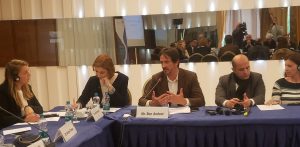 Albanian journalist Ben Andoni represented the media perspective with regards to EU enlargement. He argued that the media in Albania and the wider region is viewed as the enemy of the government, which hampers transformative reforms that are being proposed. The difficult operating space for journalists does not allow the media to perform its watchdog function on accession criteria related to corruption, the rule of law, justice reform, administrative reform and democracy. This causes the reality of the Albanian context to be absent from literature and media reporting, something that will only become worse at the media is now faced with an even more substantial issue, namely that of the soon to be adopted New Law on Media.
Albanian journalist Ben Andoni represented the media perspective with regards to EU enlargement. He argued that the media in Albania and the wider region is viewed as the enemy of the government, which hampers transformative reforms that are being proposed. The difficult operating space for journalists does not allow the media to perform its watchdog function on accession criteria related to corruption, the rule of law, justice reform, administrative reform and democracy. This causes the reality of the Albanian context to be absent from literature and media reporting, something that will only become worse at the media is now faced with an even more substantial issue, namely that of the soon to be adopted New Law on Media.
Mr. Andoni continued by mentioning that the reforms already undertaken have been beyond the reality of the Albanian context. The justice reform has so far only worsened the situation and the administrative reform never managed to reach its objectives. With the changes of rules as Mr. Macron has proposed, it will be impossible to continue moving forward with accession-related reforms unless there are clear incentives. As for the media, it is becoming increasingly difficult for us to raise our vision about what should be done to push transformative reforms. In Mr. Andoni’s opinion, Albania’s transition ended in 1998 with the declaration of the constitution. What needs to happen now, it that the Albanian media needs stronger support from every element of society. There needs to be more respect for journalist; Albanian institutions need to provide more support for the entire media sector, and there is a need for financial support. On top of that, in order for the media sector to be able to perform its watchdog function, Albania needs to abolish the informality that surrounds all levels of society.
Mr. Andoni did admit that the media “also has deficits”, as he states that “some of [his] colleagues are not well informed about the EU enlargement process, the deadlines and the steps that need to be taken”. Mr. Gledis Gjipali (Executive Director of European Movement in Albania) highlighted that indeed, the process of EU integration has become more difficult because even after meeting accession criteria there is still concerning uncertainty. In addition, the process of EU integration has become an abstract and elitist process that is limited by bureaucracy in the high structures of society. At the same time, we require from media and other different actors in civil society to be involved in the process that has evolved. Mr. Gjipali added that in the beginning there were the duties and standards that needed to be completed, but as time evolved the prospects are unknown and highly dependent on the political will in Member States.
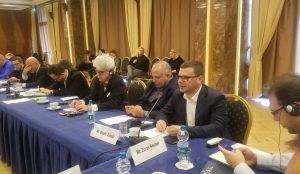 With regards to the political aspect, Mr. Gjipali emphasizes that we need to have a clear engagement and support from the EU countries in order to make the accession process work. Particularly promising in this aspect is the second non-paper that was drafted recently. The nine Member States involved have a softer option and better approach than France, which shows the continuous political engagement of these Member States. As per the economic problem highlighted earlier in the panel, Mr. Gjipali thinks that the issue should be seen within the country itself rather than something in relation to EU accession. Eventually, substantial reforms can happen only if there is a will to implement these ideas in our society. Something that is urgently missing in Albania, as Mr. Gjipali states that the political class is practically against integration.
With regards to the political aspect, Mr. Gjipali emphasizes that we need to have a clear engagement and support from the EU countries in order to make the accession process work. Particularly promising in this aspect is the second non-paper that was drafted recently. The nine Member States involved have a softer option and better approach than France, which shows the continuous political engagement of these Member States. As per the economic problem highlighted earlier in the panel, Mr. Gjipali thinks that the issue should be seen within the country itself rather than something in relation to EU accession. Eventually, substantial reforms can happen only if there is a will to implement these ideas in our society. Something that is urgently missing in Albania, as Mr. Gjipali states that the political class is practically against integration.
The fourth speaker of the panel, SP Secretary of Foreign Relations Teuta Vodo, noted that there is substantial political will in the Albanian government: “We are optimistic the EU transformative power will continue for Albania and other Western Balkan countries. Although the process has become more technical, I believe that Albania is moving ahead with the justice reform.” However, Arben Kashahu, Secretary of Foreign Relations of the DP, holds a different view. According to him Member States identified many political crises in Albania, causing the country to not be ready for opening accession talks in October. He argues that Albania should not accuse Macron for blocking accession talks, but instead learn a lesson and look at internal dynamics to push reforms rather than support from outside.
The Policy Forum’s participants discussion points out that the majority of Tirana’s non-state stakeholders agree on the need to reform the enlargement process to make it more substantive, with tangible benefits for the citizens and the economy, through an approach that accelerates structural reforms particularly in areas related to political criteria and economic capabilities, and welcoming a strict and merit-based conditionality. While it is essential to have the new methodology applicable to all WB countries, participants unequivocally emphasized the need for clear EU membership perspective for the region.


